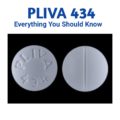The white, elliptical / oval pill with the imprint PLIVA 334 has been identified as Metronidazole 500 mg. It is supplied by Teva Pharmaceuticals USA. Metronidazole is in a class of medications called nitroimidazole antimicrobials. It works by stopping the growth of bacteria.
PLIVA 334 pill is used to treat infections of the reproductive system, gastrointestinal (GI) tract, skin, heart, bone, joint, lung, blood, nervous system, and other areas of the body. PLIVA 334 pills are also used to treat sexually transmitted diseases (STDs).
Antibiotics will not work for colds, flu, or other viral infections. Using antibiotics when they are not needed increases your risk of getting an infection later that resists antibiotic treatment.
How should I take PLIVA 334 pill?
PLIVA 334 pill are usually taken as a one-time dose (or divided into two doses in a day) or two to four times daily for up to 10 days or longer. Follow the directions on your prescription label carefully, and ask your doctor or pharmacist to explain any part you do not understand. Take metronidazole exactly as directed. Do not take more or less of it or take it more often than prescribed by your doctor.
Continue to take this medication even if you feel well. Do not stop taking it without talking to your doctor. If you stop taking this medication too soon or skip doses, your infection may not be completely treated and the bacteria may become resistant to antibiotics.
PLIVA 334 pill are used to treat bacterial vaginosis in women.
This medication may be prescribed for other uses; ask your doctor or pharmacist for more information.
What special precautions should I follow?
Before taking metronidazole,
- tell your doctor and pharmacist if you are allergic to metronidazole, secnidazole (Solosec), tinidazole (Tindamax), any other medications, or any of the ingredients in metronidazole preparations. Ask your pharmacist for a list of the ingredients.
- tell your doctor if you are taking or have taken disulfiram (Antabuse). Your doctor may tell you not to take metronidazole if you are taking disulfiram or have taken it within the past 2 weeks.
- tell your doctor and pharmacist what prescription, nonprescription medications, vitamins, nutritional supplements, and herbal products you are taking or plan to take. Be sure to mention any of the following: anticoagulants (‘blood thinners’) such as warfarin (Coumadin, Jantoven), busulfan (Busulfex, Myleran), cimetidine (Tagamet HB), lithium (Lithobid), phenobarbital, and phenytoin (Dilantin, Phenytek).
- tell your doctor if you have or have ever had Crohn’s disease, or blood, kidney, or liver disease.
- tell your doctor if you are pregnant, plan to become pregnant, or are breastfeeding. If you become pregnant while taking metronidazole, call your doctor. Women who are pregnant generally should not take metronidazole during the first trimester (first 3 months) of pregnancy.
- do not drink alcoholic beverages or take products with alcohol or propylene glycol while taking this medication and for at least 3 days after your final dose. Alcohol and propylene glycol may cause nausea, vomiting, stomach cramps, headache, sweating, and flushing (redness of the face) when taken with metronidazole.
What should I do if I forget a dose?
Take the missed dose as soon as you remember it. However, if it is almost time for the next dose, skip the missed dose and continue your regular dosing schedule. Do not take a double dose to make up for a missed one.
What are the side effects of PLIVA 334 pill?
Metronidazole may cause side effects. Tell your doctor if any of these symptoms are severe or do not go away:
- vomiting
- nausea
- diarrhea
- constipation
- upset stomach
- stomach cramps
- loss of appetite
- headache
- dry mouth
- sharp, unpleasant metallic taste
- furry tongue; mouth or tongue irritation
Some side effects can be serious. If you experience any of the following symptoms, call your doctor immediately:
- numbness, pain, burning, or tingling in your hands or feet
- seizures
- rash
- itching
- hives
- peeling or blistering skin
- flushing
- stuffy nose, fever, sore throat, or other signs of infection
- joint pain
- dizziness
- difficulty speaking
- problems with coordination
- confusion
- agitation
Metronidazole may cause other side effects. Call your doctor if you have any unusual problems while taking this medication.
In case of emergency/overdose
In case of overdose, call the poison control helpline at 1-800-222-1222. If the victim has collapsed, had a seizure, has trouble breathing, or can’t be awakened, immediately call emergency services at 911.
Symptoms of overdose may include the following:
- nausea
- vomiting
- loss of muscle coordination
- numbness, pain, burning, or tingling in your hands or feet
- seizures.
What other information should I know?
Keep all appointments with your doctor and the laboratory. Your doctor will order certain lab tests to check your response to metronidazole.
Before having any laboratory test, tell your doctor and the laboratory personnel that you are taking metronidazole.
Do not let anyone else take your medication. Your prescription is probably not refillable. If you still have symptoms of infection after you finish the metronidazole, call your doctor.
It is important for you to keep a written list of all of the prescription and nonprescription (over-the-counter) medicines you are taking, as well as any products such as vitamins, minerals, or other dietary supplements. You should bring this list with you each time you visit a doctor or if you are admitted to a hospital. It is also important information to carry with you in case of emergencies.






